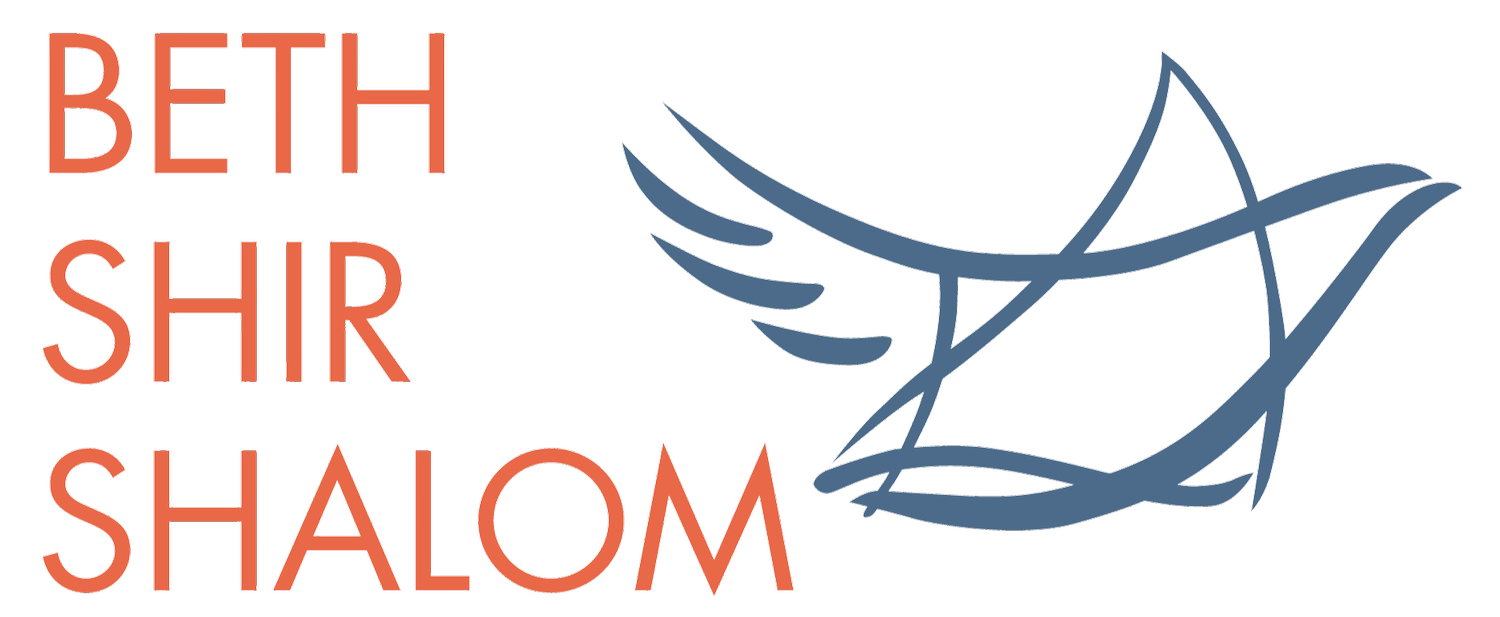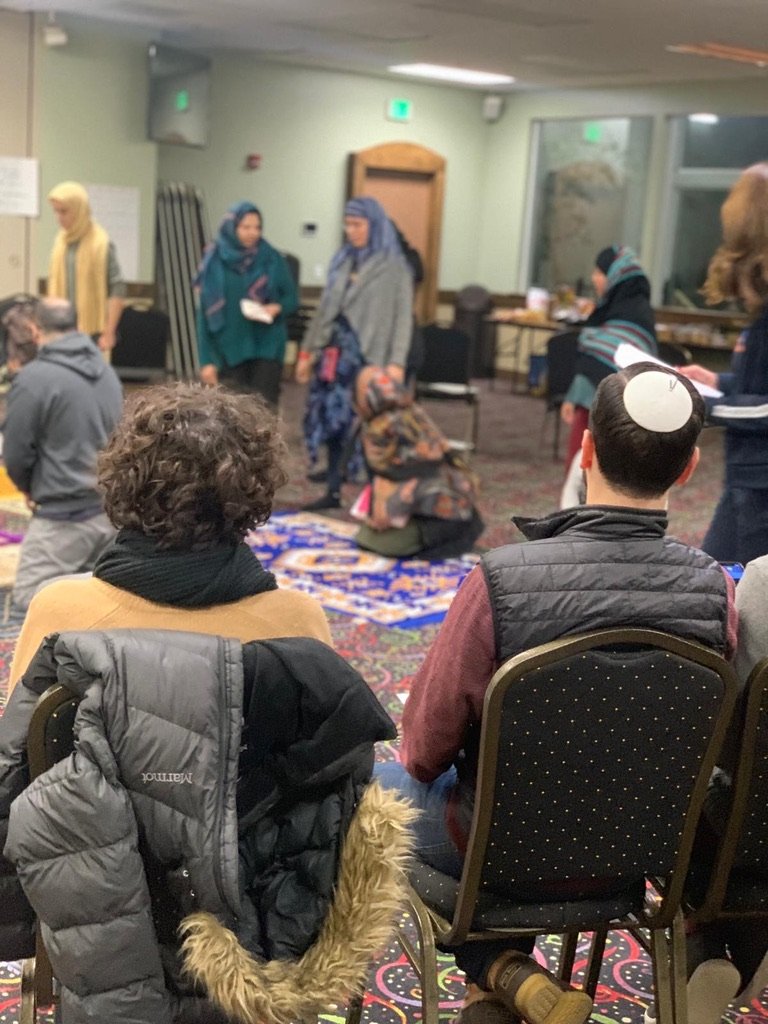On Dissent - 5785
A few years ago, I sat with Jews and Muslims of all different backgrounds, ages, and religiosity. There were 22 of us from across LA committed to a yearlong cohort with NewGround: A Jewish-Muslim partnership for change. We spent Wednesday evenings getting to know each on a deep and meaningful level. We learned about Judaism and Islam, we listened to each other's stories and experiences, and discussed challenging topics like our personal experiences with antisemitism and islamophobia, as well as deeply charged issues like the conflict in Israel-Palestine. The cohorts of this fellowship invest in bridge building across the Jewish-Muslim religious divide, but also across the intrafaith divine present within the Jewish members of the cohort and the divides present within the Muslim members of cohort. The room was tense that night, as a member of our cohort became emotionally charged and verbally aggressive towards the presenter, an esteemed professor of Jewish history.
They guided us through the ebbs and flows of Jewish history and the vast impact of antisemitism on Jewish communities. He, like historian Salo Baron before him, pushed back against the lachrymose conception of Jewish history; that narrative we Jews sometimes tell ourselves that our history is just a series of tragedies, persecutions, and suffering. Antisemitism was certainly a persistent, irrational hatred, but–they insisted–it didn’t define Judaism. Judaism was more than just the survival of other’s bigotry.
The agitator that evening was a Jewish man whose family had escaped the Holocaust. He took offense to the professor’s attempt to contextualize antisemitism academically. It was a moment where a professor was teaching from 30,000 feet and came into conflict with a personal, family story on the ground.
As I sat there, watching the scene unfold, I had this a-ha moment. I watched my fellow cohort member behave in a way that I had behaved before: reacting in defensive disbelief. I realized in that moment how often we, both as individuals and as communities, struggle to hold multiple truths in our minds at the same time. It’s sometimes difficult to rise above our own experiences, to resist the expected narrative, to see that our truth is not the only truth. My heart went out to my cohort member, whose pain was so real and personal. But I also wished he could have risen above his family’s story, if only for a moment, to recognize that the professor was not invalidating his experience but simply offering a different, broader perspective. Instead, shortly afterwards, he chose to leave the cohort. And this is a microcosm of our society today. We exist in echo chambers; we digest only the news and information we choose to see; we unfollow and isolate from those we disagree with. And believe me – I get it.
Sometimes we can’t find the right words to express ourselves. Sometimes we fear how others will interpret our words, so we retreat into silence or surround ourselves with only those who think like us. Other times, we grandstand on social media or in comments sections, flaunting our keyboard activism to score points and show off our sharp wit, which often lands as performative rather than constructive. In these spaces, nuance and complexity get lost, replaced by soundbites and slogans. It’s far easier to shout across the divide than it is to sit down and listen to someone with a different perspective, especially when those conversations provoke strong emotional responses. But if we only engage with people who echo our own views, we miss the opportunity to grow, to challenge ourselves, and to truly understand the world in all its messy, beautiful complexity.
My year in the NewGround cohort provided a profound lesson for me about holding space for multiple truths. In a world that often forces us into binary thinking—us versus them, right versus wrong—it’s all too easy to fall into the trap of thinking that someone else’s truth invalidates our own. But the truth is rarely so simple. The ChangeMaker fellowship, and its high school counterpart, MAJIC, were designed to bridge divides, to create space for Jews and Muslims to learn from one another and to see the world from different perspectives. Many of the most interesting differences in our group surfaced intrafaith - within our religious groups, rather than between the two faiths. And yet, even in this space, where the whole purpose was to foster dialogue and understanding, we struggled.
This past year we saw the consequences of being unable to hold multiple truths. Many of us found ourselves displaced from the world we thought we knew, alone and alienated from friends, colleagues, family members. Everyone with an internet connection pontificated, commented, reposted simplistic slogans. And perhaps this was most true on college campuses. In places meant for inquiry, curiosity and exploration, groups of self-righteous students refused to hold multiple truths, step into complex thinking, or engage those with different stories. Being Pro-Israel or Pro-Palestine was a litmus test that determined your social life on campus. These rigid lines drawn by moral purists have no room for nuance or complexity, the very purpose of higher education.
One such student who experienced this on campus was Stephen Bartell, a senior at Princeton and the president of Princeton’s Center for Jewish Life. He published a powerful reflection of his year on campus after October 7th. “As the initial attack on October 7 became a longer war…[he] felt deeply conflicted between [his] support for the State of Israel and [his] broader concerns about violence, injustice, and the loss of any human life. Worse yet,” he says, “many voices around [him], including close friends and family, suggested that [his] values [were] an irresolvable contradiction. When [he] expressed deep concern for the loss of innocent Gazan lives or pushed back against the one-to-one equation of pro-Palestinian advocacy with support for Hamas, [his] Jewish loved ones remarked with condescension that [he had] been brainwashed or somehow lost touch with [his] Jewish values. Conversely, when [he] argued that calls for Israel’s erasure are rooted in an unreasonable, often antisemitic double standard or explained that [he] cannot in good conscience support activists calling to “globalize the intifada,” [his] progressive-minded peers dismissed [his] lack of solidarity as a sign of complicity or a faulty moral compass. [His] failure to fall fully in line with either side of the debate [left him feeling alienated and isolated.]”
I don’t know about you but, I feel really seen by Stephen’s reflections of the past year. I love Israel with all my heart and soul, and ardently defend its right to exist and defend itself. And, I spent much of the past year deeply concerned about the well being and safety of innocent Palestinians in Gaza. This shouldn’t be a hot take – to affirm the sanctity of all human life, to affirm our Jewish obligation to redeem the captives as one of the most important mitzvot, to dream about a better future for all peoples.
And yet, when the world thinks in black and white, when social media trains us to think in binaries, when our American political system tells us it’s us versus them, and you have the courage to stand in the gray, you get attacked from both sides.
This isn’t to ignore, discredit, or dismiss the most egregious radicals–sometimes coming from off campus to agitate–who have made campus unsafe physically and emotionally for Jewish and Palestinian students. I’ve seen and heard reports from local Hillel colleagues and have had difficulty digesting some of the most disgusting behavior. But polls show this behavior doesn’t represent the vast majority of college students or American adults. We know the vast majority exist in the gray. And this in-between is where Jews live and where Judaism thrives.
This idea of holding simultaneous truths and probing our human understanding for the sake of heaven, for the sake of the greater good, is inherent Judaism. Our tradition records, studies, and celebrates multiple, sometimes contradictory, perspectives. Asking questions and discussing the answers are celebrated traditions of our faith.
We see this most clearly in the relationship between two of the greatest Talmudic sages, Hillel and Shammai. For three years, the Talmud tells us (Eruvin 13b), they disagreed until one day, a heavenly voice emerges to say: “Eilu v'eilu divrei Elohim chayim—both these and those are the words of the living God.” The Talmud tells us that even opposing viewpoints carry divine truth, emphasizing the importance of holding space for multiple truths within our tradition. It is a reminder that truth is not binary, but rather like a prism.
That prismatic understanding of truth is exemplified by the relationship between Reish Lakish and Rebbe Yochanan, who constantly challenge each other’s interpretations, and in doing so, they sharpened one another’s understanding of the law (Bava Metzia 84a). Their relationship shows us that disagreements, when approached with respect and curiosity instead of disdain and defensiveness, can deepen our knowledge and bring us closer to understanding complex issues. The tradition goes on to teach that their challenging relationship was so deeply connected to them both that when Reish Lakish falls ill and dies, Rebbe Yochanan soon loses his mind and ultimately dies too. He couldn’t exist without his intellectual sparring partner.
And sometimes, the Talmud leaves debates unresolved. After recording long disputes with no clear answer, the Talmud simply says: תֵּיקוּ teiku— we let it stand unresolved, a recognition that some questions have no clear answers, but that doesn’t free us to disengage. The Talmud’s acknowledgment of ambiguity is a cornerstone of Jewish thought, instilling in us that we can live with unresolved tension, and that not every issue has a definitive conclusion, a singular right answer.
Stephen concludes his essay in this spirit: “The Israeli-Palestinian conflict is endlessly complicated, and there are undeniably complex disagreements at its core. That said, we don’t stand a chance of identifying those divisions or advocating for what we believe in if we get caught up with false dichotomies. Instead, college campuses serve as the perfect environment to recognize and celebrate simultaneous truths, to unite around ideas that bridge ideological divides, and to maintain open-minded lines of communication even when we passionately disagree. In doing so, we each gain a great power: the power to define what we believe on our own terms, to build communities around mutual understanding and empathy, and to create thoughtful dialogue that challenges us in the spirit of a Jewish tradition we can all be proud of.”
As Jews in 2024, we must lean into our tradition’s embrace of dissent. We must challenge assumptions and honor multiple truths, even if it feels uncomfortable. In a world that pressures us to choose sides, to simplify complex issues, we must find the courage to resist. We have the power to honor the complexity of our own beliefs and the beliefs of others. Judaism is not simplistic or dogmatic, and we should all feel secure as unique links in the chain of Jewish continuity to discuss challenging topics, to ask question, to not know the answer, and perhaps most importantly, to change our mind. It is through this kind of engagement that we truly uphold the values of our tradition, creating space for dialogue, for growth, and for a more nuanced understanding of the world around us.
So, as we enter 5785, after a year of painful oversimplification and a refusal to engage in complexity, may we find the courage to stand in the gray, to hold multiple truths, and to build bridges rather than walls. Though others might lean into black and white thinking, that doesn’t give us permission, as Jews, to join them. Let us remember that our tradition thrives in complexity, and it is through that complexity that we find our enduring strength l’dor v’dor - from generation to generation.
Gmar Chatimah Tovah.

